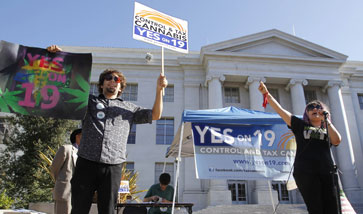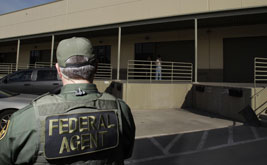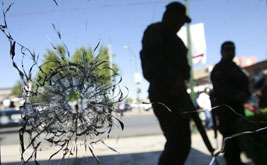Beyond the Fair Sentencing Act Beyond the Fair Sentencing Act
Congress's vote to scale back mandatory sentences for federal crack cocaine offenses was a watershed in the long campaign for better drug policy.
Dec 9, 2010 / Feature / Marc Mauer
Decriminalizing Poverty Decriminalizing Poverty
America doesn't have a drug problem. It has a poverty problem.
Dec 9, 2010 / Feature / Bruce Western
The Verdict on Drug Courts The Verdict on Drug Courts
Drug courts have helped some addicts recover. But they may be delaying expansion of treatment programs that will best reduce harms from addiction.
Dec 9, 2010 / Feature / Tracy Velázquez

Restoring Lost Liberties Restoring Lost Liberties
The drug war has been waged not only on traffickers and users but on liberty and equality.
Dec 9, 2010 / Feature / David Cole
A New Model for Mexico A New Model for Mexico
The problem with the drug war in Mexico is not that it's unfunded. It's unwinnable.
Dec 9, 2010 / Feature / Laura Carlsen

Altered State: California’s Pot Economy Altered State: California’s Pot Economy
Despite the defeat of Proposition 19, growers in California are expanding a profitable system for cultivating pot.
Dec 9, 2010 / Feature / Sasha Abramsky
Questions for the Drug Czar Questions for the Drug Czar
Sasha Abramsky recently spoke by phone with Gil Kerlikowske, director of the Office of National Drug Control Policy, about prospects for drug reform in America. You can also read the full transcript or listen to a podcast of the conversation. There is a lot of discussion about the spiraling cost of the drug war and a lot of evidence that attitudes on the issue are changing. Where is the American discourse on drugs heading? We have to help people understand there are very cost-effective, basic strategies that can be effective. We don't have to throw up our hands and say the war on drugs has failed and therefore we have to go for legalization. We should look at these other prevention and treatment issues. There's the president's budget request for additional funding for prevention: science-based, evidence-based practices, additional funds for treatment. Talking about addiction as a disease. Recognizing that treatment is a part of primary healthcare. How do you bring conservative critics along for this ride? Some conservative critics are already there. They recognize and will tell you that merely trying to make arrests, make seizures, trying to incarcerate, is not a particularly smart way of addressing the drug problem. Every state is looking at how to reduce their prison population, their criminal justice costs, and at the same time keep their communities safe. What programs do you think are particularly effective, and how can they become better integrated into the criminal justice system? Just like all bureaucracies, the criminal justice system can move slowly. But drug courts have proved effective—they started with one twenty-one years ago, and there're now about 2,500 around the country. Intensive supervision of people who have been arrested and are out on bond or on parole or probation. The Drug Market Initiative, being tested in [nearly thirty] cities, led by John Jay College, is worth looking at, although that is still to be evaluated. It's a pre-arrest diversion: rather than arrest someone and take them out of their neighborhood in the back seat of a police car, they are asked to come to a voluntary meeting where the prosecutor and the police show evidence and ask the person to make a choice about whether they'd like to get help. As you expand these programs, what is your measure of success? Reducing the number of deaths and the number of people who come into emergency rooms as a result of drugs is important. It's not only very high; it's very costly. And we've set some pretty ambitious goals over the next five years for decreasing the number of young people who engage in drug use. That'll be important. Then, of course, there are the other, more intangible things, because the drug issue is so intertwined with dropout rates from school, healthcare costs, and a prepared and educated workforce.
Dec 9, 2010 / Feature / Sasha Abramsky

Budding Prospects: Youth Activists Push Marijuana Reform Budding Prospects: Youth Activists Push Marijuana Reform
Fueled by serious funds, young advocates of legalization are poised for big gains.
Dec 9, 2010 / Feature / Aaron Houston

Obama’s Drug War Obama’s Drug War
The administration is promoting failed law enforcement programs as economic stimulus.
Dec 9, 2010 / Feature / Michelle Alexander

As Juárez Falls As Juárez Falls
The killing in Juárez bears less resemblance to warfare between cartels than to criminal anarchy.
Dec 9, 2010 / Feature / Ed Vulliamy
